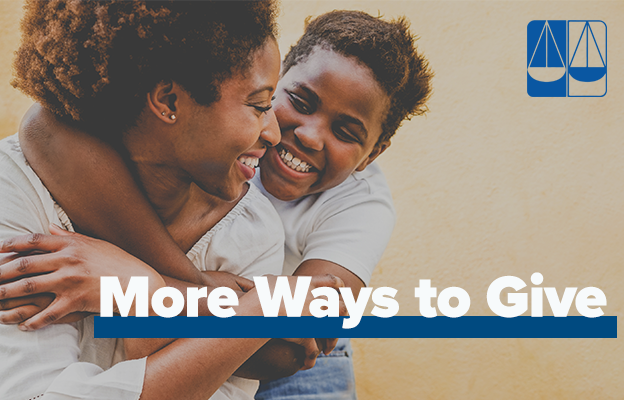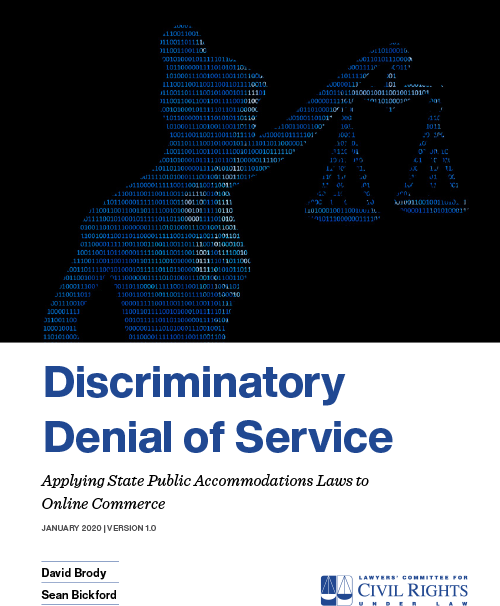The Digital Justice Initiative works at the intersection of racial justice, technology, and privacy. Exploitative data practices, discriminatory algorithms, invasions of privacy, disinformation, and online hate disproportionately target and harm communities of color, especially Black Americans, immigrants, women of color, and LGBTQ people of color. Everyone should be entitled to the equal enjoyment of the internet’s goods and services without fear of discrimination or reprisal.
For more information, feel free to email us at digitaljustice@lawyerscommittee.org.
Digital Redlining and Algorithmic Bias
When companies use complex algorithms to analyze large amounts of personal data and make decisions about economic opportunities, there is a very high risk of discrimination and disparate impacts on the basis of race, sex, and other protected characteristics. If they are not carefully designed and tested, these algorithmic systems can perpetuate, recreate, or amplify existing or historical inequality of opportunity–such as disproportionately excluding Black Americans from receiving housing advertisements or women from job openings. This is known as digital redlining. Combatting digital redlining and algorithmic bias is a top priority of the Digital Justice Initiative.
Learn more about our litigation, legislative, and advocacy work on digital redlining and algorithmic bias.
Privacy and Data Protection
The Digital Justice Initiative advocates for the enactment of comprehensive privacy and data protection laws that prioritize civil rights. “Privacy rights are civil rights.” We care about privacy because it prevents our own identities and personal information from being used against us unfairly. Strong privacy protections can help prevent data-driven discrimination, disinformation and voter suppression, online harassment, and identity theft, all of which disproportionately impact communities of color.
Learn more about our work promoting privacy and data protection here.
Facial Recognition & Other Biometric Technologies
Many biometric technologies, such as facial recognition, discriminate against people of color—such as being less accurate with darker-skinned individuals, especially women of color. Moreover, even if a tool does not discriminate directly, that does not mean it is incapable of harm. These technologies are often deployed by law enforcement to over-police communities of color, or by employers to surveil their workers. No matter how complex a biometric technology is, they are just tools in the hands of those who wield them. If a technology is used to make a discriminatory system more efficient, that is a discriminatory use of the technology because it increases the quantity or quality of harm. The Digital Justice Initiative advocates for limits on the use of these technologies.
The Digital Justice Initiative fights online voter suppression, disinformation, and election interference targeting Black Americans and other marginalized communities. We work with Election Protection to monitor for voter suppression activity online, report it to the relevant online platforms or authorities for enforcement, and, when necessary, bring litigation in conjunction with our Voting Rights Project. We co-chair the Online Voter Suppression Working Group at the Civil Rights, Privacy, and Technology Roundtable.
Litigation
Smith v. Trump, No. 21-cv-2265 (D.D.C.)– January 6 Attack on the U.S. Capitol
Representing several U.S. Capitol Police Officers, the Lawyers’ Committee sued former President Trump, his campaign, Roger Stone, Stop the Steal, the Proud Boys, the Oath Keepers, and others for the January 6 assault on the U.S. Capitol. We allege a conspiracy to overturn the election results and infringe civil rights in violation of the KKK Act, the D.C. Bias-Related Crimes Act, and other laws.
- Find out more about the case here.
Nat’l Coalition on Black Civic Participation v. Wohl, No. 20-cv-8668 (S.D.N.Y.) – Voter Intimidation Robocalls
In August 2020, just weeks before the presidential election, voter intimidation robocalls were sent to tens of thousands of voters in several states. They were targeted at Black voters and tried to scare people away from voting by mail. The Lawyers’ Committee sued the men who sent the call for violating the Voting Rights Act and the KKK Act. We won a temporary restraining order in which the Court described the defendants’ conduct as “electoral terror.” Acting on a report by the Lawyers’ Committee, the Federal Communications Commission proposed a $5 million against defendants, the largest ever for robocalls violating the Telephone Consumer Protection Act.
Advocacy
Racist Robocalls Enforcement by FCC
In 2020, the Digital Justice Initiative notified the Federal Communications Commission and provided briefings on a neo-Nazi whose robocall operations targeted communities of color and political candidates of color with racist and anti-Semitic messaging. We explained why the hateful messaging caused more harm than an ordinary robocall, and how he violated FCC regulations, which led the FCC to impose a nearly $13 million fine. This is the first time the FCC has brought an enforcement action against someone using telecommunications unlawfully to terrorize communities of color, and certainly one of the largest civil penalties ever imposed on an individual white supremacist by a federal agency.
The Digital Justice Initiative investigates, litigates, and advocates against white supremacy and other forms of hate that use the Internet to target Black Americans and other marginalized communities. There are serious real-world harms from online hate, including chilling effects on equal participation in online commerce and social activities; economic and reputational injuries to minority-owned businesses; psychological injuries from threats of violence, rape, and death; living in fear for one’s personal safety; and the instigation of hate crimes. Online hate also suppresses free speech, by intimidating the target community into self-censoring and impeding the target’s free and equal use of the platform.
Litigation
Metropolitan A.M.E. Church v. Proud Boys Int’l, 21-ca-4 (D.C. Super. Ct.) – Vandalism of Black Church On December 12, 2020, the Proud Boys attacked and vandalized the Metropolitan A.M.E. Church, a historic Black church in downtown Washington, D.C., because of its support for the Black Lives Matter movement. The Proud Boys are a violent, neo-fascist, all-male group with ties to white nationalism. The Lawyers’ Committee filed suit against the Proud Boys and their leaders for violating the D.C. Bias-Related Crimes Act and federal civil rights laws.
- Learn more about the case here.
Dumpson v. Ade, No. 18-cv-1011 (D.D.C.)– Online Threats and HarassmentIn 2017, the Lawyers’ Committee for Civil Rights Under Law brought a lawsuit on behalf of Taylor Dumpson after she was targeted by a hate crime following her inauguration as the first Black woman student body president of American University. After nooses were hung on campus targeting her, Dumpson was singled out by a neo-Nazi website and barraged with online threats and harassment. The lawsuit alleged that the neo-Nazis violated her right to equal enjoyment of public accommodations and right to education under the D.C. Human Rights Act. For the first time anywhere in the United States, the court ruled that online harassment can unlawfully interfere with equal enjoyment of public accommodations and awarded her over $725,000.
- Learn more about the case here.
Nwanguma v. Trump, No. 17-6290 (6th Cir.) – amicus brief At a campaign rally in Louisville, Kentucky in 2016, then-candidate Donald Trump encouraged attendees, including members of a neo-Nazi group, to attack protesters–which they did. The Lawyers’ Committee filed an amicus brief in a case brought by the injured protesters against Trump, arguing that he incited the violent attack and used racist dog whistles to encourage white supremacist violence. The U.S. Court of Appeals for the Sixth Circuit ruled that plaintiff’s had not adequately alleged that Trump’s speech constituted unlawful incitement of violence.
Advocacy
Comments to Facebook Oversight Board on Trump Ban In February 2021, we submitted comments to the Facebook Oversight Board, urging them to permanently ban former President Trump from Facebook because of the risk he poses to further incitement of violence and promotion of racism. Trump’s lying attacks on the election and promotion of violence threatened our democracy and made anyone who disagreed with him a target for online hate and harassment – especially Black Americans fighting for racial justice and voting rights.
Letter to Mark Zuckerberg on Civil Rights Violations In November 2019, the national Lawyers’ Committee sent an open letter to Mark Zuckerberg, CEO of Facebook, warning him of the company’s legal liability for civil rights violations.
- Read the letter here.
Publications
Report: Hate in Elections: How Racism and Bigotry Threaten Election Integrity in the United StatesThe Digital Justice Initiative supported a report from the James Byrd Jr. Center to Stop Hate on Hate in Elections: How Racism and Bigotry Threaten Election Integrity in the United States. The report was released in September 2020, foreshadowing events to come.
While the Digital Justice Initiative works across several different areas to ensure equal justice for all online, there are sometimes specialized situations where we file litigation or advocate in conjunction with other Lawyers’ Committee programs, particularly concerning matters relating to First Amendment rights.
Black Lives Matter D.C. v. Trump, 20-cv-1469 (D.D.C.) – Protester Rights
On June 1, 2020, law enforcement officers violently attacked peaceful demonstrators in Lafayette Square, across from the White House, who had gathered to protest police brutality following the murder of George Floyd. The crowd was assaulted with tear gas, rubber bullets, clubs, shields, and horses to clear the way for a photo op for the president. On June 4, the Lawyers’ Committee filed a lawsuit on behalf of Black Lives Matter D.C. and several individual protesters against then-President Trump, then-Attorney General William Barr, and other officials.
- Learn more about the case here.
Mahanoy Area Sch. Dist. v. B.L., 141 S.Ct. 2038 (2021) – amicus brief
The U.S. Supreme Court, in an 8-1 decision, adopted the First Amendment interpretation advanced by the Lawyers’ Committee and more than 30 other organizations in a case about school regulation of online and off-campus speech by students. The case involves a 14-year-old high school student who was suspended from her school’s cheerleading team for using expletives on her personal social media, off school grounds, on a weekend, and did not mention the school. In complete agreement with our amicus brief, the Supreme Court ruled that schools should rarely intervene in off-campus student speech, especially speech involving political or religious matters, but that schools retain the authority to intervene to prevent harassment, bullying, cheating, or similar harms.
- Read the amicus brief here.
“Today, almost 150 years later, the forces and conflicts that animated Congress’s adoption of the Ku Klux Klan Act as well as subsequent voting rights legislation, are playing out again before this Court, though with a difference. In the current version of events, the means Defendants use to intimidate voters, though born of fear and similarly powered by hate, are not guns, torches, burning crosses, and other dire methods perpetrated under the cover of white hoods. Rather, Defendants carry out electoral terror using telephones, computers, and modern technology adapted to serve the same deleterious ends. Because of the vastly greater population they can reach instantly with false and dreadful information, contemporary means of voter intimidation may be more detrimental to free elections than the approaches taken for that purpose in past eras, and hence call for swift and effective judicial relief.”
– National Coalition on Black Civic Participation v. Wohl, 498 F.Supp. 3d 457, 464 (S.D.N.Y. 2020)


